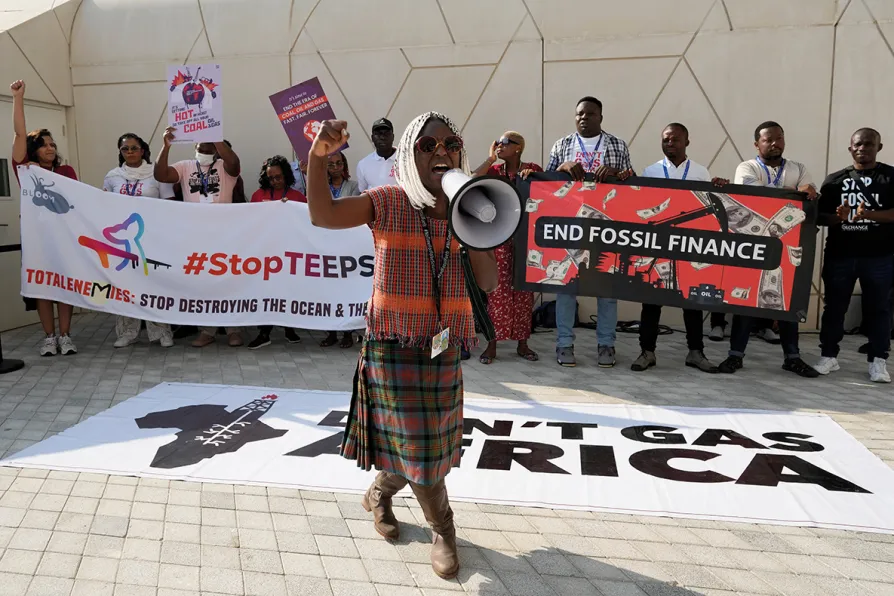As the government quietly upgrades the role of Britain’s special forces, their growing global footprint and near-total exemption from democratic oversight should alarm us all, says ROGER McKENZIE

 Protesters outside the COP28 conference
Protesters outside the COP28 conference
AS I write this article, I am in Dubai, as one of the British Parliament’s non-voting delegates to the Cop28 UN climate change summit.
Cop28 has been called a “new Davos” where political deals to address climate change are “overshadowed by the business deals being made,” and as an event “led by bankers and lobbyists.”
In the week leading up to Cop28, the headlines were filled with accusations that the UAE was using its role as host “as an opportunity to strike oil and gas deals” — a manoeuvre that UN secretary-general Antonio Guterres condemned as a “serious breach” of standards.
This reality sums up one of the most fundamental issues with Cop28 and every Cop event that has taken place since it was inaugurated in 1995 — since the very beginning, Cop has been shaped by corporate interests and particularly by the very fossil fuel industry that sits at the heart of the climate crisis.
This year’s event, which is taking place in one of the world’s biggest oil-producing countries, is not only full of oil executives, it is run by one Dr Sultan al-Jaber the chief executive of Adnoc, the UAE’s national oil company.
Dr Jaber has not been reticent about his continuing enthusiasm for his industry. Early in the event — while the BBC reports that governments and fossil fuel companies are “going big” on ending the use of fossil fuels — reportedly, he had said publicly that there is “no science” underpinning the demands of climate activists for the phasing out of fossil fuels.
This conflict is woven through the very fabric of the event. Only last month, Guterres called fossil fuels the “poisoned root of the climate crisis” that is “racing our planet down a dead-end 3°Celsius temperature rise” and must be “torn out” to have any chance of keeping global warming to 1.5°C or less.
Although 3°C may not sound like a huge rise to the uninitiated, for context the difference between the modern era and the last ice age that put Britain under hundreds of metres of ice is 5°C. A 3°C rise in a few decades will be a societal and humanitarian disaster.
The governments of low-lying island nations such as Kiribati are already attempting to arrange for their people to “migrate with dignity” as their homes disappear beneath rising seas. Parliamentarians from Africa and other developing nations, attending Cop28 have signed a document, at the conclusion of their climate parliament, recognising a major “emissions and implementation gap” and committing to push their governments harder, but they are a small minority of those present.
Logically, oil and gas companies should be making decisions that will rescue the 1.5°C target, because the societal and geographical chaos that will result from not doing so will make their profits meaningless.
But in reality, they do not do so. Oil companies and intermediaries appear to be flying in, using Cop to make deals behind the scenes, while publicly on the international stage, pledges are made that are inadequate to begin with and then abandoned or ignored almost as quickly as they were made.
And again, the Cop28 host illustrates a microcosm of this conflict and deficiency. In 2006, the Masdar City initiative was launched as part of Abu Dhabi’s “Vision 2030,” out of a subtle admission by the Emirates that their current oil-based economy was unsustainable.
Today, 17 years later, only two square kilometres of the planned six have been built and its planned population of 50,000 is — at most — 6,000. The initial promises that it would be a zero carbon, zero waste city have been abandoned and replaced by “low carbon” and “low waste” aspirations.
In the same way, it can be argued that the pledges and plans of successive Cop events have never been implemented, with promised reductions in greenhouse emissions instead becoming rises.
So relentless has this failure been that in May the World Meteorological Organisation reported that there is a 66 per cent likelihood of exceeding the 1.5°C threshold in at least one year between now and 2027.
July this year was, globally, the hottest month ever recorded, leading Guterres to state that “the era of global warming has ended, and the era of global boiling has arrived … climate change is here; it is terrifying, and it is just the beginning. It is still possible to limit global temperature rise to 1.5°C … but only with dramatic, immediate climate action.”
September this year was then an astonishing 0.5°C hotter than the previous record for the month. Last weekend leading climate scientist Zeke Hausfather confirmed that last month was also the hottest November on record “by a wide margin” and was 1.6°C above pre-industrial levels. Hausfather has described the latest climate statistics as “absolutely gobsmackingly bananas.”
But instead of following the UN secretary-general’s call to rip out the “poisoned root” of fossil fuel interests, it can be argued, that the UN’s Cop28 is built around their interests with no sign that that this will change in future.

IAN SINCLAIR recommends an important and timely book for climate politics right now and in the future

From summit to summit, imperialist companies and governments cut, delay or water down their commitments, warn the Communist Parties of Britain, France, Portugal and Spain and the Workers Party of Belgium in a joint statement on Cop30

Reaching co-operation is supposed to be the beginning, not the end, of global climate governance, argues LISA VANHALA











